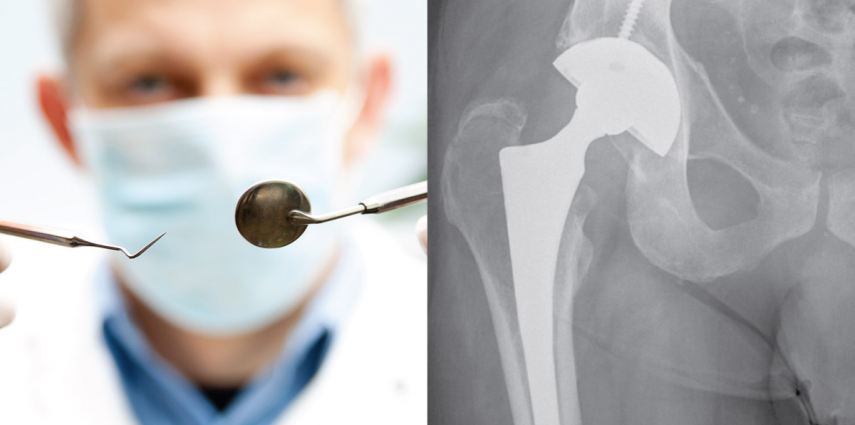Deep Infection after Total Joint Replacement can be a serious, devastating and costly complication, often necessitating an extended hospital stay, multiple operative procedures and prolonged antibiotic use which in some cases can be lifelong. Speak to anyone who has had a serious infection and they will let you know it’s not a pleasant experience.
It is thought that a small proportion of late infections result from bacteria which normally live within the mouth or oral cavity. It is well recognized that these oral bacteria travel into the bloodstream at the time of dental treatment or even with vigorous teeth cleaning/flossing. These now “circulating” bacteria can deposit themselves onto the surface of a joint replacement implant and once there adhere strongly to the metal where they multiply and if unlucky lead to an infection which is difficult for the body to eradicate. It has been advocated that antibiotics given before dental treatment may reduce the chances of a blood borne infection occurring.
Antibiotics and Dental Treatment
So what is the story with antibiotics and dental treatment? There is no definitive scientifically based answer – only recommendations from various bodies. It would be very difficult to set up a proper scientific study to examine this issue because we are talking about a very small number of infections in a very large number of patients. The American Dental Association and the American Academy of Orthopaedic Surgeons have produced a number position statements on this topic. In 2009 these bodies recommended that antibiotics should be given before any kind of dental treatment or examination but in 2012 watered this recommendation down, leaving it up to the surgeon and patient in each case. Guidelines regarding antibiotic use in this circumstance are certainly not uniform across the world.
Bodies like the Canadian Dental Association advocate not giving antibiotics at all. They cite the fact that most infections are due to Staphylococci – which is true. Whilst most Staph live on the skin, some are present in the mouth. It is thought that most Streptococcal infections (not a common but still significant cause of joint infections) probably originate from the oral cavity. The other reason stated for not giving antibiotics is the development of bacterial resistance. This patently ridiculous when one considers the amount of antibiotic given for this purpose in comparison with the population’s overall antibiotic consumption. Dental associations and dentists don’t look after patients with joint infections but orthopaedic surgeons do – this may explain some of the discrepancies in advice from various learned bodies.
At the moment, until there is definitive evidence to the contrary, I would recommend all joint replacement patients are given antibiotics an hour before any significant dental treatment (fillings, root canal treatment or deep scaling – anything where there is a likelihood of bleeding). Amoxycillin 1g or Erythromycin (in those with an allergy to Penicillin) is generally what I prescribe. It is thought (but not proven) that there is increased risk in patients with diabetes or those with suppressed immune systems and early days after joint replacement surgery (some say the first 3 months, others the first 2years).
As an aside, any patient with a joint replacement who develops a bacterial infection anywhere (ingrown toenail, cellulitis, any abscess etc) should seek medical attention early and have appropriate antibiotic therapy instituted.


